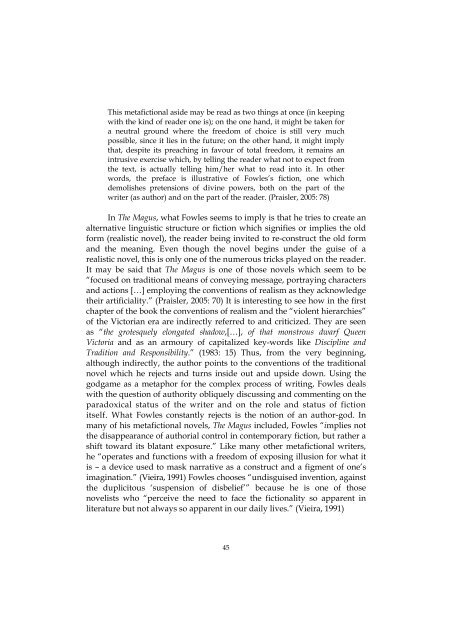translation studies. retrospective and prospective views
translation studies. retrospective and prospective views
translation studies. retrospective and prospective views
You also want an ePaper? Increase the reach of your titles
YUMPU automatically turns print PDFs into web optimized ePapers that Google loves.
This metafictional aside may be read as two things at once (in keeping<br />
with the kind of reader one is); on the one h<strong>and</strong>, it might be taken for<br />
a neutral ground where the freedom of choice is still very much<br />
possible, since it lies in the future; on the other h<strong>and</strong>, it might imply<br />
that, despite its preaching in favour of total freedom, it remains an<br />
intrusive exercise which, by telling the reader what not to expect from<br />
the text, is actually telling him/her what to read into it. In other<br />
words, the preface is illustrative of Fowles’s fiction, one which<br />
demolishes pretensions of divine powers, both on the part of the<br />
writer (as author) <strong>and</strong> on the part of the reader. (Praisler, 2005: 78)<br />
In The Magus, what Fowles seems to imply is that he tries to create an<br />
alternative linguistic structure or fiction which signifies or implies the old<br />
form (realistic novel), the reader being invited to re-construct the old form<br />
<strong>and</strong> the meaning. Even though the novel begins under the guise of a<br />
realistic novel, this is only one of the numerous tricks played on the reader.<br />
It may be said that The Magus is one of those novels which seem to be<br />
“focused on traditional means of conveying message, portraying characters<br />
<strong>and</strong> actions […] employing the conventions of realism as they acknowledge<br />
their artificiality.” (Praisler, 2005: 70) It is interesting to see how in the first<br />
chapter of the book the conventions of realism <strong>and</strong> the “violent hierarchies”<br />
of the Victorian era are indirectly referred to <strong>and</strong> criticized. They are seen<br />
as “the grotesquely elongated shadow,[…], of that monstrous dwarf Queen<br />
Victoria <strong>and</strong> as an armoury of capitalized key-words like Discipline <strong>and</strong><br />
Tradition <strong>and</strong> Responsibility.” (1983: 15) Thus, from the very beginning,<br />
although indirectly, the author points to the conventions of the traditional<br />
novel which he rejects <strong>and</strong> turns inside out <strong>and</strong> upside down. Using the<br />
godgame as a metaphor for the complex process of writing, Fowles deals<br />
with the question of authority obliquely discussing <strong>and</strong> commenting on the<br />
paradoxical status of the writer <strong>and</strong> on the role <strong>and</strong> status of fiction<br />
itself. What Fowles constantly rejects is the notion of an author-god. In<br />
many of his metafictional novels, The Magus included, Fowles “implies not<br />
the disappearance of authorial control in contemporary fiction, but rather a<br />
shift toward its blatant exposure.” Like many other metafictional writers,<br />
he “operates <strong>and</strong> functions with a freedom of exposing illusion for what it<br />
is – a device used to mask narrative as a construct <strong>and</strong> a figment of one’s<br />
imagination.” (Vieira, 1991) Fowles chooses “undisguised invention, against<br />
the duplicitous ‘suspension of disbelief’” because he is one of those<br />
novelists who “perceive the need to face the fictionality so apparent in<br />
literature but not always so apparent in our daily lives.” (Vieira, 1991)<br />
45












